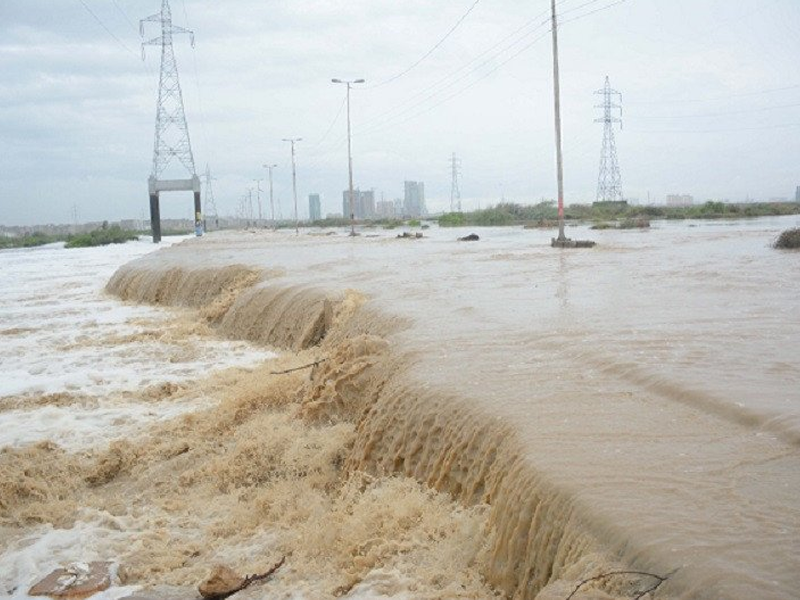The nature’s wrath and fury

- 387
- 0
As if the previous rains devastations were not enough to wreak havoc, yet another heavy spell of monsoon is upon us with the Met office warning of severe urban flooding and utmost trouble across the country during the ongoing week.
According to the Pakistan Meteorological Department (PMD), the rainfall this year has broken the record of sixty-two years with the month of July recorded as the wettest month so far this year with 181 per cent above average rainfall.
As a matter of fact, the entire country is in grip of torrential rains and every province has suffered not only in term of the losses of precious lives but entire villages and sources of livelihood like cattle and crops have been washed away in deluges of rains, rendering thousands of people homeless and without any food and shelter. Exact data is not available but the number of rain- affected people but the actual number may be running in lakhs and in the wake of this unprecedented number of affectees, one would appeal the donors agencies to come to the rescue of these helpless people as the current catastrophe is beyond repair and also beyond the capacity of the Pakistan authorities which are already reeling under huge economic crisis.
In this backdrop, it is welcome to note that the government has planned to organise a donors' moot for the help and rehabilitation of flood affected localities, both urban and rural, of the country. Though the government has directed the concerned authorities to ensure make-shift arrangements for the affecting by providing them 50,000 tents and one lakh ration bags to them, but that is not enough to cater to the huge numbers of flood-hit people across the country. The government must expedite its efforts to make an SOS to the international institutions and donor agencies and abreast them about the devastation caused by floods to come and become part of the ongoing relief and rehabilitation process in the country. One would also appeal to the philanthropists and multinational companies to come to the fore and generously contribute their bit to the PM's Flood Relief Fund. As a matter of fact, the three consecutive monsoon spells in the country have been abnormal which can be gauged from the fact that over 300 people have died in rain-related incidents, with Balochistan reporting the highest deaths, according to PDMA figures.
And over-forty thousand houses and other properties have been damaged but what is most fearing is that a new rain system has arrived which can prove quite destructive as the infrastructure has already become weak due to previous spells of rains and it feared that major urban centres across the country including Islamabad are at risk of flooding. Meanwhile, latest reports say that 15 persons were killed in rain related incidents in Balochistan, Gilgit-Baltistan The number of rain deaths is continuing to soar with each day and reports reaching here said that another 27 persons lost their lives in incidents caused by torrential rains in across the country, From Khyber to Karachi to Kashmir, it's a saga of devastation and destruction.
As reported, an entire village was swept in Poonch district, where 10 members of a family lost their lives when the roof of their mud house collapse in heavy rains. Gone are the days when rains were to be enjoyed by the citizens as now almost every heavy rain turns into a turmoil, playing havoc with the infrastructure in both urban and rural areas in so many ways. When it rains, the basements are full of water; electricity goes missing; the danger of billboards looms large, low-lying areas are washed out by rains and rain water enters houses even in posh areas as was seen during the cloud bursts two years back in Karachi and in Islamabad. Urban flooding has been the new phenomenon of rain emergencies in big urban centres and it is the result of climate change effects and mere advice to citizens by the government and PDMA are not sufficient to avert the impending dangers. Not only Pakistan, the entire region has been facing this danger as is evident from the current state of India and Bangladesh where the monsoon rains are playing havoc with the lives of citizens, damaging properties and also taking toll on lives of citizens. The question arises to whether the Federal and provincial governments are ready to deal with the climate change effects. Seemingly it is not the case. The government has taken inadequate preparations made for dealing with devastating rains in urban centres across the country. The case of Islamabad which was badly affected by cloudbursts in 2021 and earlier of Karachi in 2020 are enough to show that the devastation of urban flooding due to torrential rains cannot be overcome easily.
It is a countrywide issue and not just confined to big cities. Gilgit-Baltistatn are already in danger zone due to glacier-melting in the wake of extreme heatwaves which is prevailing in GB right due to which the glaciers are melting which have been causing flooding in rivers and nullah and the people living new river banks are seemingly exposed to danger of floods. The only difference is that in urban centres, it is the cloudbursts; which cause torrential rains and subsequent flooding but in areas like Gilgit-Baltistan it is the glaciers; bursts which result in flooding of the nullah and rivers which wash everything alongside rivers banks etc. It is not safe anywhere in the country right now in the wake of heavy rainfall predictions as it is poised to cause heavy flooding and the situation can reach a level of 2010 floods.
Published in The Daily National Courier, August, 25 2022
Like Business on Facebook, follow @DailyNCourier on Twitter to stay informed and join in the conversation.

















































